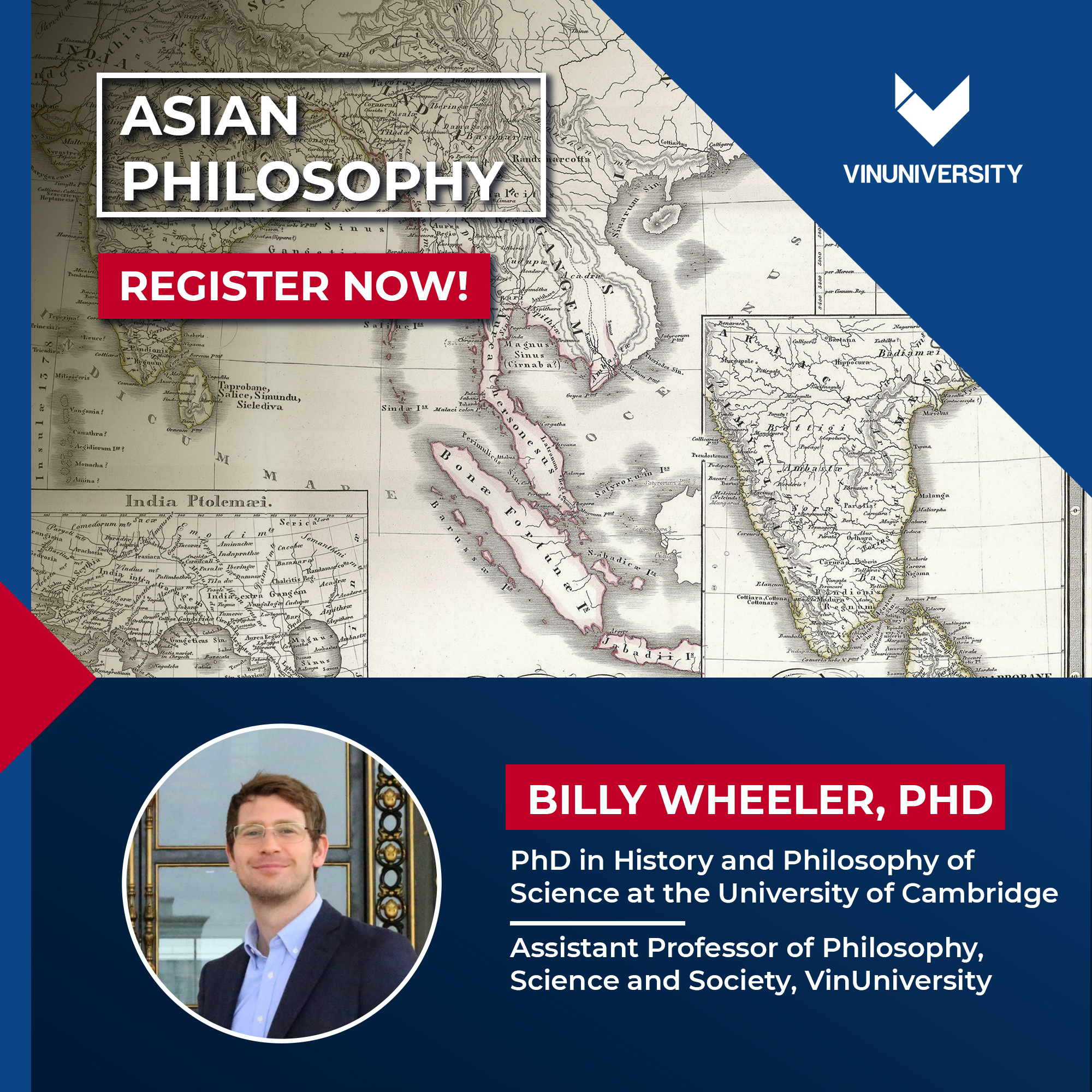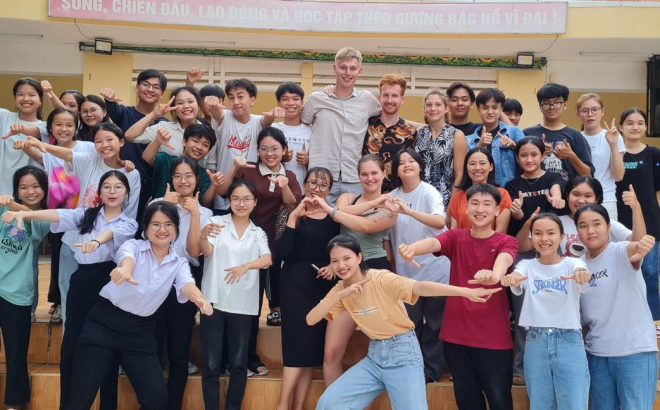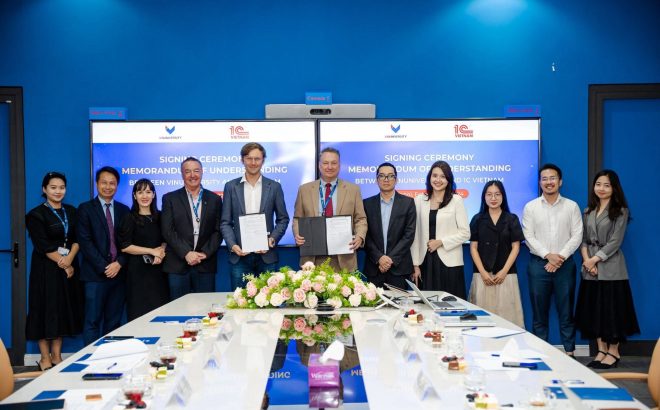Unique and exciting educational opportunity
VinUniversity’s Faculty of Arts and Sciences opens to current year 1-4 university/collegiate students and offered candidates (in the Early Admission of VinUni this year) to register and attend our courses free of charge (Certificate will be granted by VinUniversity upon the completion of the registered course):
- Asian Philosophy: every Monday 9:00-10.50 am within 15 weeks including field study (from 8th March 2021).
- Cross-Cultural Navigation: every Thursday 9:00-10.50 am within 15 weeks (from 11th March 2021).
- Music Appreciation: every Tuesday 9:00-10.15 am within 15 weeks (from 9th March 2021).
Mode of lecture: in English (required for IELTS of 6.5 or equivalent), or bilingual in some sessions and in class room with VinUni students (or online depending on the COVID-19 situation). Class size: 30.
Venue: Lecture Hall, VinUniversity, Vinhomes Ocean Park, Gia Lam Disstrict, Hanoi.
Register here. Application deadline: 11.59 pm on Tuesday 2nd March 2021. Only 15 seats are available to each course.
ASIAN PHILOSOPHY
ABOUT THIS COURSE
Succeeding in a global workplace requires understanding the philosophical worldviews that shape a culture and way of thinking. For too long, Asian philosophy has been a marginal or specialist subject within philosophy. However, this is now changing. Many of the world’s leading universities are recognizing the importance that knowledge of Asian philosophy can give to those working in a global community. Whether engaging with citizens of India, Korea or Japan, an appreciation of the concepts and ideas that underpin their culture, customs and etiquette go a long way to strengthening collaboration.
Students taking this course will develop an understanding of the major philosophical theories and arguments that have shaped countries in Asia. It will include, but not be limited to, the philosophical traditions arising out of India, China, and Vietnam. The approach taken will be that of an applied philosophy course rather than focusing on purely theoretical or historical issues. Students will apply the philosophies learnt in two different ways. Firstly, by investigating how they relate to contemporary ethical and social problems arising from the worlds of business, medicine, and technology. Secondly, students will also learn how to apply the philosophies to their own daily lives with an emphasis on well-being. This will be achieved by including a variety of external activities including: (i) an instruction class on the philosophy and benefits of yoga, (ii) a visiting instructor in Buddhist meditation, and (iii) a visit to a Daoist or Confucian temple to learn about personal development and how to cope with challenges and adversity. There will also be opportunities for additional cultural activities involving various Asian cuisines and a chance to learn basic philosophical vocabulary from the languages of Sanskrit, Chinese and Pali.
WHAT YOU WILL LEARN
- Understand the main Asian schools of philosophy: Buddhism, Daoism and Confucianism
- Engage with epistemological, metaphysical, and ethical issues and how these traditions have answered them
- Trace the unique development of these traditions in Vietnam and understand the thoughts of the major Vietnamese proponents
- Learn how these philosophical traditions are responding to contemporary ethical and social problems
ABOUT INSTRUCTOR
Dr. Billy Wheeler, Assistant Professor of Philosophy, Science and Society. Originally from the UK, he completed his BA in Philosophy at King’s College London (2003-2006) and his MPhil (2006-2007) and PhD (2007-2013) in History and Philosophy of Science at the University of Cambridge.

CROSS CULTURAL NAVIGATION
ABOUT THIS COURSE
21st century students face a rapidly changing global landscape that requires an ability to navigate the challenges of multicultural societies and work environments. In Cross-Cultural Navigation, students will develop fundamental skills necessary to achieve this objective.
The course will primarily focus on practical applications and case studies. Lectures will be used to frame and enhance content. We will explore how to communicate effectively in a multicultural environment and how to manage, negotiate, and resolve cross-cultural conflicts. In these simulations, as well as in class discussions, course members will analyze and reflect critically upon the multifaceted nature of communication, which includes verbal, non-verbal, and written forms of expression, as well as central customs and practices that give shape to relationships.
WHAT YOU WILL LEARN
Students will:
- consider the elements of cultural transmission.
- discuss basic concepts, conceptual frameworks, and other broader dimensions of culture such as social structure, religion, language, and philosophy.
- learn to recognize cultural barriers and apply tools to address and/or overcome them.
- learn to analyze and discuss examples of cross-cultural conflicts in a variety of situations.
- discover how motivation extends across cultures.
- explore the connection between culture and workplace and apply this understanding to a variety of disciplines.
ABOUT INSTRUCTORS
Reflecting the course’s dynamism, the course will be team-taught by two instructors, one Vietnamese and the other American. Professor Vũ Anh Dũng is the Founding Head of the Faculty of Arts and Sciences at VinUniversity and holds a PhD from Cambridge University. Professor Jason Picard is the Founding Assistant Professor of Vietnamese History and Culture and has a PhD from the University of California, Berkeley.

MUSIC APPRECIATION
“Music is life itself” (Louis Armstrong)
“Where words fail, music speaks.” (Hans Christian Anderson)
Photo credit: VinID, Getty Image, and Freepik, Michigan Opera
ABOUT THIS COURSE
This course offers students opportunities to learn about how music is created and how it evolves over time; it would enrich students’ musical sense, experience, and enjoyment of all types of music even if the student is not a musician. In addition, this course fosters and supports students’ development of oral and written presentation and communication, critical and analytical thinking, and multicultural perspectives.
Specifically, students taking this course will have the opportunity to explore the history of music, from the primitive musical forms through contemporary pieces around the world. Forms and genres of music include classical, jazz, theatrical music, gospel, folk, soul, blues, Latin rhythms, country, rock & roll, and hip hop. Various arrays of Vietnamese music (traditional, contemporary, theatrical, V-pop) are also discussed in this course. The course explores the relationship between music and people’s everyday life and social movements, and its cultural significance. Digital music and the evolution of the Internet and AI impacting music industry, music distribution, and global music access are also an important part of this course.
This course does not require students to have any prerequisite experience in musical theory or performance; i.e. students are not required to be able to sight-read sheet music, or play any musical instrument. Rather, it helps students become an active and intellectual music listener, as well as it helps students to think further on how music can be integrated and applied in the daily lives and their own fields of interest. This course is delivered in class and outside class environment if appropriate.
WHAT YOU WILL LEARN
- Understand music history and music genres of Vietnam and the world;
- Understand how music has evolved over time and its connection to arts and sciences, cultures and social movements;
- Become an active and intellectual music listener and be able to think about the application of music in various areas of daily life, academic and professional works.
Upon the completion of the course, students will be able to:
- Describe and explain the key concepts of music history and genres;
- Learn, analyze and appreciate classical and theatrical music pieces and performances;
- Reflect on the application of music in various areas and how music may help in their own areas of interests;
- Get familiarized with and learn to apply digital platform in music creation and enjoyment;
- Apply knowledge and techniques learned from the course and course mentors in their music projects (either practicum or research project, or both).
ABOUT INSTRUCTOR/GUEST SPEAKERS/ARTISTS
This course is delivered and facilitated by Ms. Lien Trinh (PhD Candidate, MA) who has a background in music performance. Ms. Lien Trinh is currently a faculty member of Faculty of Arts and Sciences, VinUniversity.
Guest speakers and artists are experts in the music and entertainment industry, who have diverse backgrounds in music making, producing, and performing.




